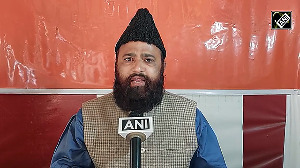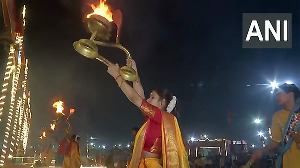Aseem Chhabra introduces us to the best of Berlinale.
I usually spend 10 days of February in Berlin attending the Berlinale, the most exciting international film festival in Europe, in the early part of the year.
It would have been freezing cold in Berlin but warm and comfortable inside the theatres.
But this year, in keeping with the tradition established by Toronto and New York film festivals, the Berlinale also went virtual.
But the virtual part of the festival was only organised for the press and the industry.
The Berlinale officials still hope to hold a physical festival from June 9-20 where this year's films will be screened for the public.
Last year seemed to be lost to the film business, but even then, the Berlinale was able to programme a healthy selection of important works by masters as well as new film-makers from across the world.
India seemed to be one of the few film-making regions that were under-represented.
Usually, the Berlinale shows a lot of love for Indian cinema -- from Bollywood (Om Shanti Om and 7 Khoon Maaf) to art house (Marathi films Killa and Sthalpuran). This year, the festival showcased only two experimental films from India: one feature length (For Those Who Do Not Drown) and the other a short (The Coast).
Here's my list of top 15 films that I watched at Berlinale.
Wheel of Fortune and Fantasy (Japan)

Japanese film-maker Ryûsuke Hamaguchi's last film Happy Hour was a six-hour long, slow-burning epic drama about the lives of four women in Kobe.
His new film Wheel of Fortune and Fantasy is only two-hours long, but here he narrates three separate stories.
Winner of the Grand Jury Prize, the film is set in contemporary Japan, with each story exploring loves and relationships of the film's characters.
In the first film, a woman realises that her best friend has started dating her ex-boyfriend.
In the second, a woman tries to seduce a college professor by reading out to him an explicit sex sequence from his own novel.
And in the third, two women meet after a long time, open up about their lives, only to realise that they have mistaken each other for someone else.
Each story is unique, at times funny, but ultimately also sad.
In the universe that Hamaguchi creates, love, loss, disappointments all come hand-in-hand.
There are coincidences but his characters also create their own stories based on their imaginations.
Mr Bachmann and His Class& (Germany)

Dieter Bachmann is a school teacher in Stadtallendorf, a small town with a large number of Turkish, Russian, Bulgarian, Kazakhstani and Moroccan immigrants.
His students, in their early teens, are also from the same immigrant and working-class backgrounds.
Some were born in Germany, while others are recent arrivals, struggling with the German language and an alien country's culture.
In Director Maria Speth's three-and-a-half-hours documentar -- winner of the Silver Bear Jury Prize -- we spend a lot of time with Mr Bachmann and his adorable students.
Despite its length, Mr Bachmann and His Class is one of the most engaging and inspiring cinematic experiences where the focus is not just the education, but the democratic and secular way in which each child is made to feel she/ he can have a dual identity, German as well as that of their country of origin.
In a time when we see right wing, anti-immigration forces emerging in parts of Europe (and even in the rest of the world), there is something remarkable about the education system offered in the school where Mr Bachmann teaches.
The students learn music, German and mathematic, but along the way Mr Bachmann gives all kinds of life lessons to the children, including the idea sharing, working in groups, marriage, same-sex relationships and even discusses the right age for them to explore sex with their partners.
It feels really cool to go to the school and attend Mr Bachmann's class.
No wonder one of the film's most likeable characters -- a tall, wide-eyed Turkish boy -- says to the teacher, 'Mr Bachmann, I am very fond of you.'
It is a sweet moment in a film full of surprises and a lot of heart.
Language Lessons (US)

Mark Duplass along with his brother Jay are the stars of the American indie film movement mubblecore -- low budget films, with natural acting and dialogues.
In the last 20 years, Mark has produced, directed and especially acted in a number of mubblecore indies that are already considered classics.
In Language Lessons, a heartwarming film set in the age of the pandemic where most of our human connections were through Zoom conference calls, Duplass works with a talented writer, actress and director Natalie Morales.
Duplass plays Adam, a middle-aged gay man living in a huge house with his partner, while Morales is Cariño, his Cuban American, online Spanish teacher.
What starts off as a regular weekly Spanish conversation class soon evolves into a deeper personal connection between the two, as Adam experiences a tragedy in his life.
Meanwhile, Cariño also slowly reveals her life in Costa Rica, where she is now living, is staggered with sadness.
The entire film was shot in video chats between Duplass and Morales.
The two actors are never together in the same space. Yet, their conversations and the platonic friendship that evolves over a few weeks, make Language Lessons a beautifully moving story.
Tina (US)

At 81, Tina Turner has seen everything -- a successful music career, which made her a global icon but also a tragic past where she lived in an abusive marriage with the man who launched her as a singer.
In this emotionally rousing documentary directed by Daniel Lindsay and T J Martin, we see many facets of this artist.
But mostly, the film celebrates a survivor who reinvented her life and career in her mid-40s, something that had never happened in the world of popular music.
The documentary, a world premiere in the Berlinale Special section, is officially authorised by Tina, and it is her way to bid goodbye to her fans.
But in the process, Tina is truthful about the years of physical abuse from her late ex-husband, Ike Turner.
It is a story that she wants to put behind her as she spends her golden year with her current husband Erwin Bach in Zurich.
It is a remarkable story.
Tina met Ike when she was 17, started singing for his band, married him and became a mother of four sons (two were from Ike's previous marriage, but Tina adopted them).
For many years, Tina lived in an abusive relationship with Ike.
She admits in the documentary that she was caught up in guilt and fear.
She would feel sorry for Ike after he would beat her and then worry that if she left, there would be no one around for him.
It was a complicated and tough relationship.
After walking out of the marriage and the divorce, Tina went on release her first solo album, Private Dancer.
She was 45 years old.
The album sold over 20 million copies worldwide.
Tina describes the album, which features the hit song What's Love Got To Do With It as her debut and not comeback, since it was the first time that she worked as a solo artist.
Fans of Tina Turner will naturally love this film. But even the younger audiences will find a lot to admire in the Tina's story and of course, her exciting music.
Bad Luck Banging or Loony Porn (Romania)

This year's top Golden Bear winning film opens with a three-minute-long pornographic video.
The video is shot by a school teacher Emi (Katia Pascariu) and her husband.
It is a personal video, but the two decide to upload it on a porn site.
The video gets leaked, landing in the cell phones of many of the school parents and even some students.
The school teacher is then hauled up for a meeting with the parents, where she is almost put on a trial and has to defend her actions.
At this juncture, Director Radu Jude's film Bad Luck Banging or Loony Porn reminded me of Vijay Tendulkar's explosive play,,Silence! The Court is in Session where a school teacher is put on a mock trial by her friends for having had an abortion.
Bad Luck... exposes the post-socialist system in Romania, where many people still maintain a higher moral ground while openly reflecting their anti-Semitism and prejudice towards the minorities including the gypsies.
Shot during the post-lockup period in Bucharest, the film reflects the reality of today.
All actors wear masks which is still the norm in many countries.
Bad Luck... is deeply committed to the ideas of freedom of speech, expression and the right to privacy.
And in that regard, this film is relevant to so many societies in our current times.
Limbo (Hong Kong/China)

In Limbo, Hong Kong's action genre film-maker Soi Cheang follows the familiar territory of an older jaded cop with a tragic past and a rookie who joins him as they are assigned to catch a serial killer.
But beyond this premise, Limbo is an original, thoroughly exciting, mega violent film.
Shot in gorgeous monochromatic tones, Limbo's violence looks even more real.
Blood oozing from the bodies of victims or during fights sequences, is given a dark black hue.
Those images of blood are much more gruesome to watch than in any coloured film.
The serial killer chops off the hands of his victims, while he throws the bodies in garbage dumpsters located in crowded residential blocks of Hong Kong.
Hands and garbage become a repeated motif in the film, as the narrative plunges us from the city's dark alleys to congested apartment complexes and poorly lit stairwells.
No place feels safe in Limbo.
It may be a tough watch for those who have a low threshold for violence.
But after having seen 30 films at this year's Berlinale, I can definitely say I had most fun watching Limbo.
Souad (Egypt)

Souad is an Egyptian teenager, who wants to do all that girls of her age enjoy -- wear make-up, post pictures on social media and flirt with slightly older men, who make her feel special.
But in the complex society that Director Ayten Amin walks us into, Souad is also supposed to excel in school, watch over her younger sister, respect her parents and do all that is expected by her conservative religious community.
The clash between Souad's dreams, aspirations and the societal expectations have a disastrous effect on our young protagonist.
Amin navigates us through three facets of Souad's life: Souad's own vision of herself, later seen from the eyes of her younger sister Rabab and finally from the perspective of Ahmed, a man she loved.
What follows is an unexpected drama that is pure cinema and a heartfelt story telling.
Souad is sad, but also a lovely film watching experience.
Death of a Virgin and the Sin of Not Living (Lebanon)

In the Death of a Virgin and the Sin of Not Living, four young men, who have been friends for a while, set out on a mission one afternoon.
Each is carrying a condom with him.
They are about to lose their virginity with a prostitute they have booked for the afternoon.
First time director George Peter Barbari introduces the four as fast-talking men, who brag about how they will connect with the woman.
But underneath all this over-confidence, each man is trying hard to cover up his nervousness.
Along the way to the seedy hotel where they will see the madam and the prostitute, the men meet other peripheral characters.
In a moving and poetic technique, Director Barbari has made each character, no matter how small their role is, talk in voiceover monologues about their lives, future, successes and failures and how they will die.
What starts off as a funny rite of passage story for four men, becomes a soulful narrative where so many human experiences are documented.
Beautifully lit by the mid-afternoon sun, Death of a Virgin... feels like a short novel about the human condition.
Petite Maman(France)

Film-maker Céline Sciamma became an international sensation after her 2019 film Portrait of a Lady on Fire, which premiered at Cannes.
A year-and-a-half later, she is back with one more film exploring the female gaze but this time from the perspective of little girls.
In Petite Maman, eight-year-old Nelly (Joséphine Sanz) has recently lost her grandmother and her mother is locked up in her own phase of mourning.
Left alone with her father in her mother's childhood home, Nelly walks through the nearby forest, where she encounters another young girl Marion (Gabrielle Sanz).
The two girls look alike (the Sanz sisters are twins in real life), and it then occurs to Nelly that in Marion she is meeting her own mother as a child.
Gorgeous to look at, the film was shot during the autumn season when the leaves change colours.
Petite Maman is a beautiful film where a child understands her mother by connecting with her when she was young.
Summer Blur (China)

Coming-of-age stories are an important narrative thread in world cinema.
This is often the subject that first time film-makers attempt, perhaps sometimes adding autobiographical touches to their scripts.
This year's entry in Berlinale's Generation section, Chinese film-maker Han Shuai's Summer Blur is one of the best coming-of-age films in the recent years.
Summer Blur is a heartbreaking story about a teenager Guo (Tian Huang), who is forced to stay with her relatives because her mother is living her own life in Shanghai.
Guo sees no way out of her miserable life in the outskirts of Wuhan: A hot summer, an aunt who treats her like a maid and babysitter, the sudden death of friend and a young boy who shows interest in her.
In her desperation, Guo makes daily calls to her mother and leaves messages.
She needs to move away from this hell but her mother will not take the responsibility.
Winner of the Grand Prix for Best Film in Berlinale's KPlus Competition, Summer Blur is a sensitive portrayal of a teenager on the cusp of becoming a woman and accepting her fate.
There are no easy answers to Gua's predicament but this much is clear: she will have to take charge of her life.
Drift Away (France)

Laurent (Jérémie Renier) is the police chief of the small force in a picturesque town near Normandy.
His days and nights are filled with stressful incidents, but none that he cannot handle with years of being a police officer.
At the beginning of the film, Laurent proposes to his live-in girlfriend of 10 years.
What makes the wedding plans all the more exciting is that the couple's young daughter will also participate in the wedding.
Then Laurent is suddenly thrown into a crisis when he accidentally shoots a farmer.
Laurent has never killed anyone in his life.
Suddenly his life starts to take a downward spiral.
In Drift Away (the French title is Albatros), Director Xavier Beauvois explores a middle-aged man who nearly has a nervous break but then sets off in a boat on a path to self-discovery.
A brilliantly realised film, much of Drift Away's mood is affected by actor Renier's emotionally intense performance.
Taste (Vietnam)

In Taste, first time Vietnamese film-maker Lê Bảo narrates the story of a Nigerian football player Bassley (Olegunleko Ezekiel Gbenga), who plays for a team in Vietnam.
But after a leg injury, he is let go from the team.
Instead of going back to Nigeria where he has a son, Bassley settles in a domestic set-up with four middle-aged Vietnamese women.
What follows is like a dream-like situation where Bassley and the women cook -- food becomes a major part of the film -- bathe and later he blow-dries their hair, sleep, copulate and carry on with their lives.
They often walk around their home without a stitch on.
It is a bizarre arrangement that is never explained, but you get a sense that all the characters are fine with the way things have shaped up.
Taste won the Special Jury Award in the Encounters section at the Berlinale.
It is a like a strange hallucinatory journey, mostly within the dark confines of a space, gorgeously shot, with a beautiful moody productions design.
More than a film, it is a stunning work of art.
Introduction (South Korea)

South Korean Hang Sang-soo is one of the world's most prolific film-makers, making couple of films a year.
His scripts are light weight, usually dealing with men and women walking, meeting at cafes and generally exploring relationships.
And for that reason, Sang-soo has major fans and many vocal detractors.
Sometimes even the detractors (I find myself in that camp) cannot help but appreciate the honesty with which he depicts young people and their uncertainties when dealing with love and relationships.
Introduction is a black and white, 66-minute-long feature film which was awarded the Silver Bear for Best Screenplay.
Here, Sang-soo's young protagonist Youngho (Shin Seokho) is trying to find his way in the world.
Unsure about love, he follows his girlfriend to Berlin who later drops him for a German man.
Meanwhile, Youngho's makes half-hearted attempts to become an actor, inspired by a middle-aged performer who is friends with his parents.
He seeks clarity in life, but there is no text book to teach him which direction he should go.
Eventually, Sang-soo tells us this: what will make Youngho an adult are lessons he will learn from life. Heartache and disappointments will harden the man.
Azor (Argentina/Switzerland)

In Director Andreas Fontana's Azor, a Swiss private banker Yvan De Wiel (Fabrizio Rongione) visits Argentina in the 1980s with his wife.
The country is being run by a military junta, and the elite, including the Catholic Church, are all for reforms and re-education of the youth.
Meanwhile, there are references to people missing, including perhaps Yvan's colleague, who had made deep connections with the country's elite but was critical about human rights abuses carried out by the military.
Director Fontana takes us through private clubs, rich country homes with large swimming pools and horse racing venues.
Throughout the film, there is tension as De Wiel hears more and more about the political suppression.
Will he go along with the mood of ruling elite in the interest of his business? That's the question raised in the audience mind.
At an exclusive party, De Wiel's wife Ines (gorgeous French actress Stéphanie Cléau) explains to another woman the idea of a secret code among private bankers.
One word she mentions is 'Azur,' which means 'be quiet' or 'careful what you say.'
And that sums up the point of this stunning film.
Copilot (Germany)

Asli is a Turkish student living in Hamburg.
At a drunken party, she meets a Lebanese student named Saeed.
There is an instant attraction and the two cannot stay away from each other.
But there is a problem.
Even though the two are Muslims, Asli's Turkish mother considers herself superior to Arabs.
So they cannot make their relationship open.
Director's Anne Zohra Berrached's Copilot is a sweet romantic film, with tough edges.
Even after the two lovers get married, Saeed has secrets that he keeps from Asli.
There is too much unhappiness in the Muslim world and so he has to take a drastic action which will involve him joining radical Islamic forces.
Copilot tells us love alone is not enough to bind two people.
Beliefs and ideas can have overbearing impact on young minds and the results can be drastic.












 © 2025
© 2025